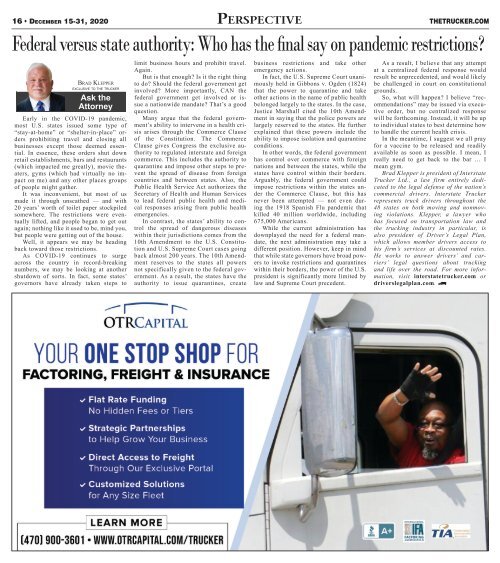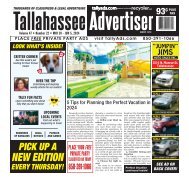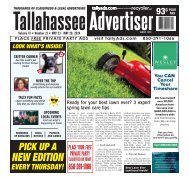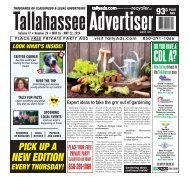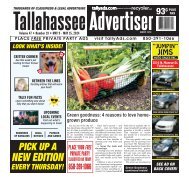Create successful ePaper yourself
Turn your PDF publications into a flip-book with our unique Google optimized e-Paper software.
F<br />
T<br />
a<br />
16 • December 15-31, 2020 Perspective<br />
Brad Klepper<br />
exclusive to the trucker<br />
Ask the<br />
Attorney<br />
Early in the COVID-19 pandemic,<br />
most U.S. states issued some type of<br />
“stay-at-home” or “shelter-in-place” orders<br />
prohibiting travel and closing all<br />
businesses except those deemed essential.<br />
In essence, these orders shut down<br />
retail establishments, bars and restaurants<br />
(which impacted me greatly), movie theaters,<br />
gyms (which had virtually no impact<br />
on me) and any other places groups<br />
of people might gather.<br />
It was inconvenient, but most of us<br />
made it through unscathed — and with<br />
20 years’ worth of toilet paper stockpiled<br />
somewhere. The restrictions were eventually<br />
lifted, and people began to get out<br />
again; nothing like it used to be, mind you,<br />
but people were getting out of the house.<br />
Well, it appears we may be heading<br />
back toward those restrictions.<br />
As COVID-19 continues to surge<br />
across the country in record-breaking<br />
numbers, we may be looking at another<br />
shutdown of sorts. In fact, some states’<br />
governors have already taken steps to<br />
limit business hours and prohibit travel.<br />
Again.<br />
But is that enough? Is it the right thing<br />
to do? Should the federal government get<br />
involved? More importantly, CAN the<br />
federal government get involved or issue<br />
a nationwide mandate? That’s a good<br />
question.<br />
Many argue that the federal government’s<br />
ability to intervene in a health crisis<br />
arises through the Commerce Clause<br />
of the Constitution. The Commerce<br />
Clause gives Congress the exclusive authority<br />
to regulated interstate and foreign<br />
commerce. This includes the authority to<br />
quarantine and impose other steps to prevent<br />
the spread of disease from foreign<br />
countries and between states. Also, the<br />
Public Health Service Act authorizes the<br />
Secretary of Health and Human Services<br />
to lead federal public health and medical<br />
responses arising from public health<br />
emergencies.<br />
In contrast, the states’ ability to control<br />
the spread of dangerous diseases<br />
within their jurisdictions comes from the<br />
10th Amendment to the U.S. Constitution<br />
and U.S. Supreme Court cases going<br />
back almost 200 years. The 10th Amendment<br />
reserves to the states all powers<br />
not specifically given to the federal government.<br />
As a result, the states have the<br />
authority to issue quarantines, create<br />
business restrictions and take other<br />
emergency actions.<br />
In fact, the U.S. Supreme Court unanimously<br />
held in Gibbons v. Ogden (1824)<br />
that the power to quarantine and take<br />
other actions in the name of public health<br />
belonged largely to the states. In the case,<br />
Justice Marshall cited the 10th Amendment<br />
in saying that the police powers are<br />
largely reserved to the states. He further<br />
explained that these powers include the<br />
ability to impose isolation and quarantine<br />
conditions.<br />
In other words, the federal government<br />
has control over commerce with foreign<br />
nations and between the states, while the<br />
states have control within their borders.<br />
Arguably, the federal government could<br />
impose restrictions within the states under<br />
the Commerce Clause, but this has<br />
never been attempted — not even during<br />
the 1918 Spanish Flu pandemic that<br />
killed 40 million worldwide, including<br />
675,000 Americans.<br />
While the current administration has<br />
downplayed the need for a federal mandate,<br />
the next administration may take a<br />
different position. However, keep in mind<br />
that while state governors have broad powers<br />
to invoke restrictions and quarantines<br />
within their borders, the power of the U.S.<br />
president is significantly more limited by<br />
law and Supreme Court precedent.<br />
THETRUCKER.COM<br />
Federal versus state authority: Who has the final say on pandemic restrictions?<br />
As a result, I believe that any attempt<br />
at a centralized federal response would<br />
result be unprecedented, and would likely<br />
be challenged in court on constitutional<br />
grounds.<br />
So, what will happen? I believe “recommendations”<br />
may be issued via executive<br />
order, but no centralized response<br />
will be forthcoming. Instead, it will be up<br />
to individual states to best determine how<br />
to handle the current health crisis.<br />
In the meantime, I suggest we all pray<br />
for a vaccine to be released and readily<br />
available as soon as possible. I mean, I<br />
really need to get back to the bar … I<br />
mean gym.<br />
Brad Klepper is president of Interstate<br />
Trucker Ltd., a law firm entirely dedicated<br />
to the legal defense of the nation’s<br />
commercial drivers. Interstate Trucker<br />
represents truck drivers throughout the<br />
48 states on both moving and nonmoving<br />
violations. Klepper, a lawyer who<br />
has focused on transportation law and<br />
the trucking industry in particular, is<br />
also president of Driver’s Legal Plan,<br />
which allows member drivers access to<br />
his firm’s services at discounted rates.<br />
He works to answer drivers’ and carriers’<br />
legal questions about trucking<br />
and life over the road. For more information,<br />
visit interstatetrucker.com or<br />
driverslegalplan.com. 8


